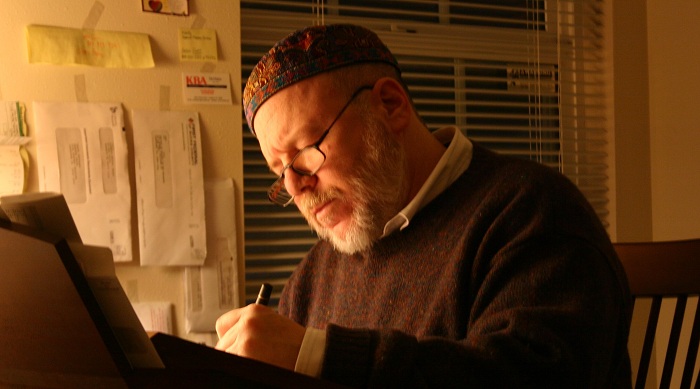 |
From the Night Factory
38. Elderly Bohemians
When I was a young man, I had a romantic notion of living abroad, starting sometime in my thirties. When I was a young man, I was still writing poetry and expected that by starting my life over in Europe perhaps, it would bring fresh experiences and insights. By moving abroad, maybe I would continue to grow mentally, stimulated by the new beauty of an unfamiliar culture. Many self-exiled American writers set me the example.
In 1983, when I was thirty-two, while travelling through Hamamatsu, Japan, I was offered a job there, and a place to live. This was my former dream come true. But another option waited. It was an unplanned-for romantic interest that had kind of snuck up on me in the months before I visited Japan. Ms Keogh, a package deal that included two kids, was waiting for me in the U.S. I gambled on love and returned to the U.S. to risk commitment. I made the correct glorious decision. I married Ms Keogh, my more significant other, but did not take her name.
Ms Keogh is not a U.S. citizen; rather, she is a subject of the Queen. She was born in Cambridge, England where her father was a doctoral student in theoretical mathematics. From early in our relationship, she claimed she wanted to eventually return home to Britain and to take me with her. Our original plan was to move after I retired.
AT&T laid me off in November of 2010 and soon thereafter I formally retired. We did not, however, move to Britain. Although I have never crossed the Atlantic, Ms Keogh made repeated trips to visit her family. After several visits, Ms Keogh felt discouraged about moving to Britain. She was disappointed by the persistent elitism and classism. More importantly, she was deterred by the cost. She didn’t believe we could afford to live in Britain, at least not to purchase a house. As for me, I was deeply disappointed.
Okay, so we were staying here. Believing this, I cultivated a nesting instinct, which I never knew I had. I took my termination pay and bought all the furniture I thought we would ever need, careful to procure what we both could love and live with for the remainder of our lives. This included flatware and kitchen devices. I believed I was investing in what remained of forever for us. Silly me.
Ms Keogh spent the last two weeks of June visiting her family in Cardiff. Half way through her stay she called. She had changed her mind, again.
All of that stuff she felt before was in an older generation. The younger generation of Brits are more open. During past visits, she previously looked at the purchase price of a house, but now she was looking at renting a small, furnished apartment. She realized we could afford it, even living within the restrictions of my pension and Social Security, our only income. She wanted to move home, was determined to move, insisted, if I really loved her and wanted to see her happy, I would facilitate our move to Wales – as early as next summer. She wanted me to think about it, to Google Pernarth, and she would call back the next day.
What do I know of Wales? My limited impressions of ancient Wales comes from books I read in youth written by Geoffrey of Monmouth and Sir Thomas Malory. On my shelf is the Mabinogion, which I started to read earlier this summer, but had to put aside. Given Ms Keogh’s future plans for us, I should soon pick it up again.
The limited knowledge I have of contemporary Wales comes from watching Jeremy Clarkson, James May and Richard Hammond, racing exotic automobiles along rural lanes by stark hillsides, beneath a threat of rain. I envy them. It is probably a restricted representation of the sights and sounds of Wales. Despite the intense pleasure I derive from cars and driving, one of the characteristics about the U.K. that is a draw is the availability of public transportation. At this time, Ms Keogh and I own two cars and a motorcycle. We own all three outright yet they are expensive, to fuel, to maintain, to repair, to have inspected every year, and to insure. Then there are also the occasional parking tickets.
I don’t speak Welsh, but then I understand only about one in six Welshman speaks Welsh. Even Dylan Thomas did not speak Welsh. The language is, to my ears, the most beautiful I have ever heard, lyrical and rich in its assortment of sounds. To my imagination, it is the language of Tolkien elves. I fear it will always remain unattainable for me. My throat and tongue cannot simulate the sounds. I do not have a knack for languages.
What about my friends here? That is exactly it, I have no friends “here” with whom I regularly meet and socialize. Take Skip in Santa Fe or Myra in Boston, I have come to count them dear friends, but how often do we sit down together to chat? What friends I have I communicate with by writing letters or typing emails. It hardly matters where I am to maintain these friendships, so long as I have access to a reliable postal system and a good connection to the internet. That should be available to me most anywhere in Britain or Europe. Well, I have been hearing terrible things about the Royal Mail being expensive and unreliable. Still, for all the difference distance makes, I could be in orbit around the earth because I communicate with my friends through writing. Living abroad is certainly not going to affect my friendships.
I am someone who has grown stronger attachments to my friends than my family. I am confident I will continue to make new friends despite my curmudgeonly ways. I have found my newest friends among the people Ms Keogh regularly plays Scrabble with in the back of a bookstore on Friday nights and I don’t even like Scrabble. Nonetheless, I accompany her because I like these people and enjoy the cramped space and good conversations. These, my most recent friends, I’ve only known for two or three years, so I don’t know them well. I am confident I will find other friends wherever I end up.
Am I fearful about living in a foreign culture? Ms Keogh has managed to do it for the last five decades, three of them with me. Heck, if she can do it, I can do it. The only place I ever felt at home was in the scent of Ms Keogh’s neck. I never felt like I belonged some place. Well, maybe Manhattan, but who can afford Manhattan? Ms Keogh claims I will find better conversations in Britain and Europe, that the people are more enlightened. She claims Humanism is prevalent and flourishing abroad. I will not be assaulted as often by religious fanatics who are determined to convert me into believing in a god no better than an Oriental despot. I don’t believe her. I am not prepared to claim the U.S. has a monopoly on fanaticism and obscurantism. I am sure there are zany beliefs on the other side of the Atlantic. But I am willing to bet I will feel more at home in Britain than in Kentucky.
The next day, when Ms Keogh called again, I told her I was willing to move to Wales, although it has since expanded to all of Britain, perhaps t he United Kingdom, maybe even the British Isles. Here I have invested in all this furniture thinking we were settling down, growing roots and moss. My custom-made wingback reading chair still looks new. I was looking forward to one day seeing it old, discolored, and the leather massaged to a buttery softness. Had the money not been invested in furniture, it would now be available to us to make the move and set up a household in wherever. We can’t afford to buy such furniture again. It was purchased with my termination pay. [“Ha!” says Ms Keogh, standing over my shoulder, “we would have spent it on something else”.]
Ms Keogh returned home the 1st July and we have been planning ever since. We are planning to forsake the furniture, declare it a costly mistake, and lead a stoic and less expensive existence. We will redesign our lives for travelling light and then we will be able to travel more. Furniture is not what this is about. Having examined our priorities, we’ve arrived at the decision that we would rather see new places and meet people, that this would be more fun than owning furniture.
The idea is, we will land in the United Kingdom homeless and commence searching for a place to live, a couple of elderly bohemians. We will bring our clothes, our dishes, our flatware, our computers, the artwork, and the books.
Maybe I should bring my motorcycle. I ride the Shadow Phantom, which in the U.S. sells for $7,499, the equivalent of £4,517 at today’s exchange rate. The same bike in the U.K., called a Shadow Black Spirit, is £7,599, or $12,613.
There is much planning to do. But now it is time to end the essay and make our third sally across the continent. We are driving to Spokane, Washington.

However far he roams, Mr Bentzman will continue to report here regularly about the events and concerns of his life. If you've any comments or suggestions, he would be pleased to hear from you.
Selected Suburban Soliloquies, the best of Mr Bentzman's earlier series of Snakeskin essays, is available as a book or as an ebook, from Amazon and elsewhere.
